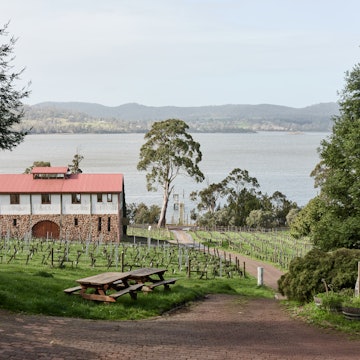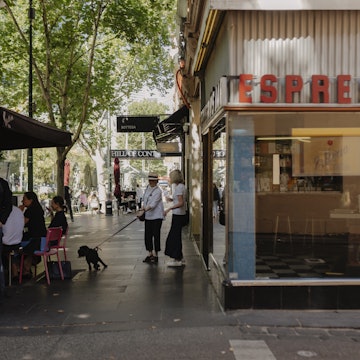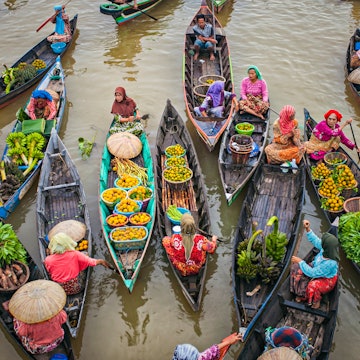
Learning from Australia’s Indigenous storytellers
Sponsored by
Mar 31, 2021 • 7 min read

Tourism is often embraced by Aboriginal communities, who recognise it as a platform through which to share their stories © Walkabout Cultural Adventures
Australia’s story is nothing short of epic. It is a story in which the natural world – continental in scale, stunning in its beauty – takes centre stage. It is also the soulful story of Australia’s first inhabitants whose deep connection to the land offers so many lessons in sustainability.
Aboriginal Australians are the world’s oldest continuous culture, their history dating back at least 60,000 years. When European settlers arrived in Australia in 1788, hundreds of culturally distinct nations, clans, and language groups inhabited what we now know as Australia and they were as diverse as the land itself. They were forest people and desert people, they were fisherfolk and farmers.
More than two centuries later, Aboriginal peoples retain an unbroken connection to the land, or to Country. Increasingly, tourism is being embraced by Aboriginal communities who recognise that, as a platform through which to share their stories, it aids in maintaining that vital bond into the future. Across the country, the ever-growing range of authentic Aboriginal tourism experiences offer the chance to hear the traditions and stories intrinsic to this culture.

Art Centres & Festivals
Travellers to Australia have long visited the Outback to have meaningful encounters with Australia’s first peoples. Once there, Aboriginal art centres are excellent places for such an experience. You could find yourself sitting alongside an artist patiently painting the intricate dot points on bark or canvas. Or you might wait out the afternoon sun in the shade with local women weaving baskets from the fronds of the pandanus palm.
Kevin, an artist who shows us around Injalak Arts in Gunbalanya, in the Arnhem Land region of the Northern Territory, says everyone benefits when travellers show an interest in these ancient traditions. “Some visitors like to just sit and watch us paint. Others like to talk and ask questions. Either way, we can learn something about each other,” he says.
At Injalak Arts, the x-ray style of painting, whereby artists paint as if able to see the subject’s interior skeleton, predominates. The style is typical of the art found in Australia’s Top End and Arnhem Land in particular, and takes its inspiration from the millennia-old art that adorns rock walls across northern Australia. Painted by the ancients, rock art is, like modern Aboriginal art, a form of storytelling about the world. From Injalak Arts you can take a tour to the nearby rock art site, one of the most significant in the region.
It’s a similar experience over in Cape York, in Queensland’s Far North, where Jarramali Rock Art Tours visits the astonishing Quinkan Country rock art sites near Laura. Ranked by UNESCO as one of the world's top ten sites for rock art, Quinkan is an open-air Outback museum of tremendous scope and significance. Some of the rock art here dates back 20,000 years. The biennial, three-day Laura Aboriginal Dance Festival is an altogether more recent expression of culture, albeit with ties to the deep past, and is Australia's largest celebration of Indigenous dance and culture. It’s also a reminder that Aboriginal art in all its forms remains one of the most rewarding entry points into Australia’s Indigenous story.

Take to the Water
But what if you can’t make it to the Outback?
Simon Thornally, owner of Saltwater Eco Tours in Mooloolaba, along Queensland’s Sunshine Coast, is glad for the opportunity to showcase his community on the shoreline. “To be able to be right here on the coast where people are already traveling – people can just jump on board and have an authentic Indigenous experience.”
Saltwater Eco Tours takes visitors out onto the rivers and further into ocean waters in a more-than-one-hundred-year-old replica of the wooden sailboat used in the first solo circumnavigation of the earth.
Led by guides from the local Kabi Kabi (Gubbi Gubbi) nation, the tours take visitors on a rich storytelling journey through local Indigenous life, past and present. Here, local foods take centre stage. It’s what Thornally describes as bush tucker-infused catering: “We combine a lot of the native herbs and flavours, as in bunya nut and lemon myrtle. We make dips and drinks. We even make cocktails – we have a fully licensed bar on board. We serve the local seafood – Mooloolaba prawns and oysters as well. Then we make a bunya nut dipping sauce for the prawns, and we use finger lime caviar over the top of the oysters.”
A 19 hours’ drive to the north in Port Douglas, the major gateway town for the Great Barrier Reef, Walkabout Cultural Adventures also has an extraordinarily rich landscape to explore.
“We’re very spoiled here,” says Juan Walker, the Kuku Yalanji owner of the company. “We have beautiful rainforest, mountains coming down to the lowland tropical rainforest areas, the estuaries and river systems, mangroves, then down onto the beaches. On the beaches there are some beautiful mudflats and coastal environments. You can even walk out to the edge of the Great Barrier Reef.”
Again, storytelling lies at the heart of how they initiate visitors into their land and culture. “We take people out and try and teach them as much as we can about the Kuku Yalanji people and our connection to country,” says Walker. “We want to show people how it’s all connected – how the rainforests are connected to the rivers which connect to the sea and the reef. It’s all intertwined and our people have been watching it for thousands of years.”
Or to put it another way, in a single day here you can journey through the millennia of Aboriginal history in one of the most beautiful corners of the planet.

City & Other Encounters
For those visiting Australia’s cosmopolitan cities, you can even have a perspective-altering experience with Australia’s Aboriginal peoples, land, and culture without leaving town.
In Melbourne, at the Royal Botanic Gardens Victoria, Indigenous guides lead Aboriginal Heritage Walks that recount the oral histories that kept their culture alive, even as a city grew up around them.
The gardens were once an important meeting place for the Boonwurrung and Woiwurrung language groups of the Kulin people, and the guided walks take you past river red gums and yellow box – eucalypts that date back nearly 350 years and predate European settlement. There’s an Indigenous rainforest, native grasslands, a native valley of ferns, and all manner of bush foods still used by Indigenous people. Watch also for plants used in ceremonies, including the traditional smoking ceremony that welcomes you to the gardens as part of the Aboriginal Heritage Walk.
“Melbourne was a city built here because there was an abundance of resources and we talk about what foods allowed our people to flourish,” says one of the guides, Christopher Jakobi, as he walks along Long Island, a fascinating refuge for native plants and birds. “That’s why this was, and remains, such an important meeting place. Prior to the arrival of the Europeans, all of those resources enabled tens of thousands of people to come together and meet on these lands for marriage and for trade. It’s a connection between past and present.”
In the heart of Sydney’s district known as The Rocks, which contains some of colonial Australia’s earliest buildings, Dreamtime Southern X puts Aboriginal creation stories front and centre.
Owner Margret Campbell takes visitors on a journey through Sydney as it was before the city that stands there today was ever imagined. She begins with a traditional smoking ceremony and reveals to visitors the small and often overlooked signposts to Sydney’s pre-European past. But above all, she recounts tales from that extraordinarily rich source, the Aboriginal Dreaming or Dreamtime and its stories of how the world was created.
Aboriginal storytellers like Campbell are oral historians whose faithful recitation today of that history helps to keep Aboriginal culture alive and true to its past. In the process, Campbell will have you looking at Sydney in a whole new way.
As for Sydney and Melbourne, so too for Australia’s other major cities.
In Perth, for example, what was once the Western Australian Museum is now the WA Museum Boola Bardip, meaning ‘many stories’ in the local Whadjuk Noongar language – apt, given the importance of storytelling in Aboriginal culture.
Across the state border in South Australia, Adelaide’s Bookabee Tours tells the city’s Indigenous Kaurna story. The highlight of the tours is the search for bush foods in the Adelaide Botanic Gardens.
Such experiences are not, of course, restricted to the cities. In Tasmania, the wukalina Walk traverses the glorious Bay of Fires in the company of a palawa Indigenous guide, tracing the footsteps of the land’s traditional owners.
As is the case with all of Australia’s new wave of Indigenous guided tours, encounters, and experiences, you’ll find yourself traveling back in time, joining the dots between modern Australia and an unbroken history, proud and still going strong.
You might also like
Australia is on the road to recovery
Australian adventures that give back to the land and people
Sponsored by Tourism Australia
As a travel entertainment and inspirational media outlet, we sometimes incorporate brand sponsors into our efforts. This activity is clearly labeled across our platforms.
This story was crafted collaboratively between Tourism Australia and Lonely Planet. Both parties provided research and curated content to produce this story. We disclose when information isn’t ours.
With sponsored content, both Lonely Planet and our brand partners have specific responsibilities:
-
Brand partner
Determines the concept, provides briefing, research material, and may provide feedback.
-
Lonely Planet
We provide expertise, firsthand insights, and verify with third-party sources when needed.













